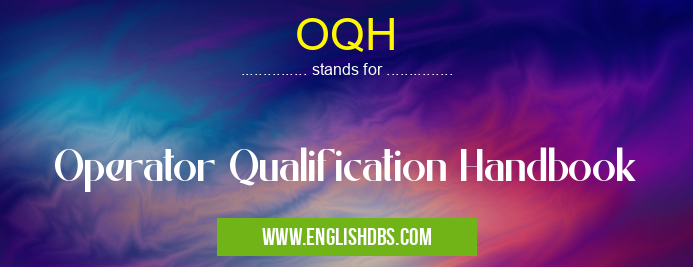What does OQH mean in GENERAL
The abbreviation OQH stands for Operator Qualification Handbook. This document is used to provide guidance and instruction on the qualification process of operators in a business or organization. The handbook provides details regarding the qualifications an operator should meet in order to be considered qualified for a specific job role, as well as details about the training and requirements they must fulfill in order to retain their qualification status. By following the guidelines laid out in the Operator Qualification Handbook, businesses can ensure that their operators are competent and qualified to safely and effectively carry out their duties.

OQH meaning in General in Business
OQH mostly used in an acronym General in Category Business that means Operator Qualification Handbook
Shorthand: OQH,
Full Form: Operator Qualification Handbook
For more information of "Operator Qualification Handbook", see the section below.
Contents of OQH
The contents of an Operator Qualification Handbook will vary depending on what type of machinery an operator needs to be qualified for, but it generally includes information regarding qualifications needed, such as any certifications or licenses required; job descriptions; safety protocols; details about applicable laws and regulations; emergency procedures; training materials; and evaluation criteria for successful completion of each training session. In some cases, an Operator Qualification Handbook may also include diagrams or pictures highlighting key parts of a machine's construction or components that need special attention when operating it. An important aspect covered by this handbook is the definition and breakdown of what tasks each person qualified on a particular piece of machinery may perform—this helps avoid confusion among employees who may have different roles but are working with similar pieces of equipment
Essential Questions and Answers on Operator Qualification Handbook in "BUSINESS»GENERALBUS"
What is the purpose of an Operator Qualification Handbook?
The purpose of an Operator Qualification Handbook (OQH) is to describe the qualification and training elements required for personnel performing activities in power plants, pipelines, process facilities, refineries and any other industry which may require specific qualifications to perform specific duties. The OQH outlines job codes for each position, describes scope of qualifications and training standards, and includes detailed information about the process.
What types of personnel require Operator Qualification Handbooks?
Personnel who take part in power plant operations, pipeline operations, process facility operations, refinery operations or any other industry which requires specialized qualifications need to be evaluated using an Operator Qualification Handbook. This includes management staff responsible for providing resources and direction to ensure that all activities are carried out safely, efficiently and with due regard to applicable legal requirements.
How does an Operator Qualification Handbook help ensure a safe work environment?
An Operator Qualification Handbook helps maintain safety by helping standardize qualified operation processes from employee to employee. By having this handbook it allows employers to be aware of each employees’ experience level for certain positions as well as their skillsets allowing them to determine if they are prepared to handle certain jobs correctly. It also allows employers to make sure that training is given when necessary thereby adding another layer of safety for both employees and company assets.
What are the key components of an Operator Qualification Handbook?
An Operator Qualification Handbook should include job codes for each position; descriptions of how scope of qualifications and training standards will be met; clear instructions on how job tasks can be performed safely; records tracking system in order to document activities related to qualification and re-qualification processes; periodic reviews in order to update information included in OQH; documentation requirements; tools available for trainers; guidance on reporting incidents or accidents related with personnel qualification issues; references used by trainers including safety standards in areas where operators may work.
Is there a limit on how many employees can qualify under one Operator Qualification Handbook?
There is no limit on how many personnel can qualify under one OQH as long as all prerequisites outlined in the OQH have been met by each individual before being allowed access within areas or operational levels that they have been assigned too.
Who is responsible for developing the initial version of an Operator Qualification Handbook?
Typically it will be a team composed by senior managers or experts with experience related with specific duties covered by the OQH guides who are responsible for developing its initial version in compliance with applicable regulations and company's policies.
Are there any legal implications if an employer fails to implement an operator qualification handbook?
Yes, failure to implement a proper operator qualification handbook may lead legal consequences such as penalties or fines depending on the jurisdiction where activities are being performed according regulation requirements applicable at such location(s).
How often should I review my companies' operator qualification handbook?
The review frequency depends upon company's policy but typically you'll need at least do it annually or when major changes take place such as personnel change/promotion/transfers which could affect further operation independence requirements.
What is meant by "scope of qualifications" in relation to operator qualification handbooks?
Scope of qualifications refers basically refers mainly what kind of knowledge/experience/skills would be needed from potential candidates when applying for a given position indicated within your organization's OQH guidelines.
Final Words:
In summary, OQH stands for Operator Qualification Handbook which outlines the necessary qualifications needed by any operator who works with specific pieces of machinery or equipment within a business setting. The handbook contains detailed information related to job responsibilities, safety measures, applicable laws and regulations, training materials, evaluation criteria and diagrams/pictures if necessary. Following an OQH helps ensure that machine operators are properly trained and qualified so that operations run smoothly and safely without disruption or accidents while still helping minimize costs associated with maintaining certification standards across multiple sections within a company or organisation.
